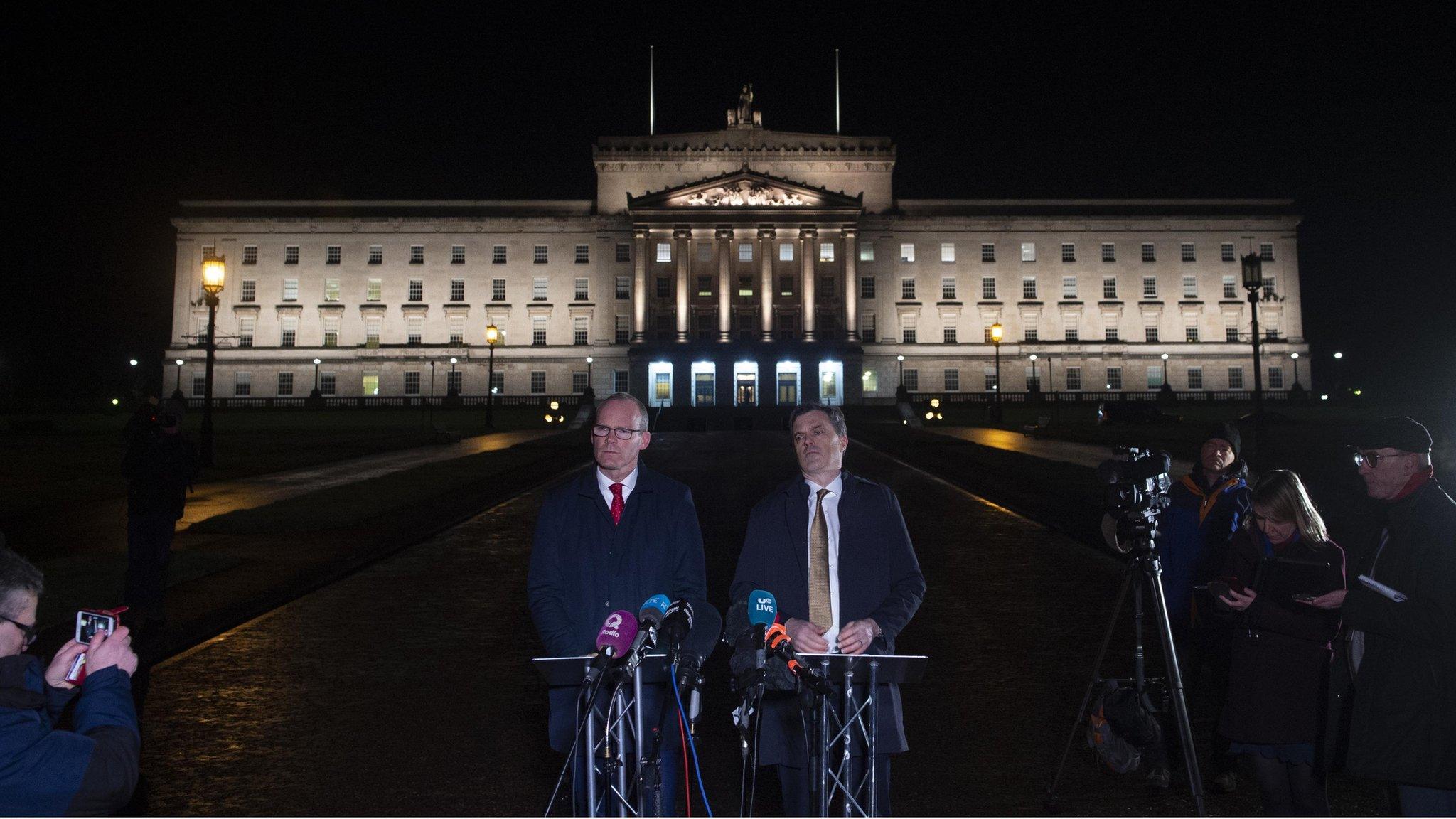Stormont talks: DUP leader supports draft deal
- Published
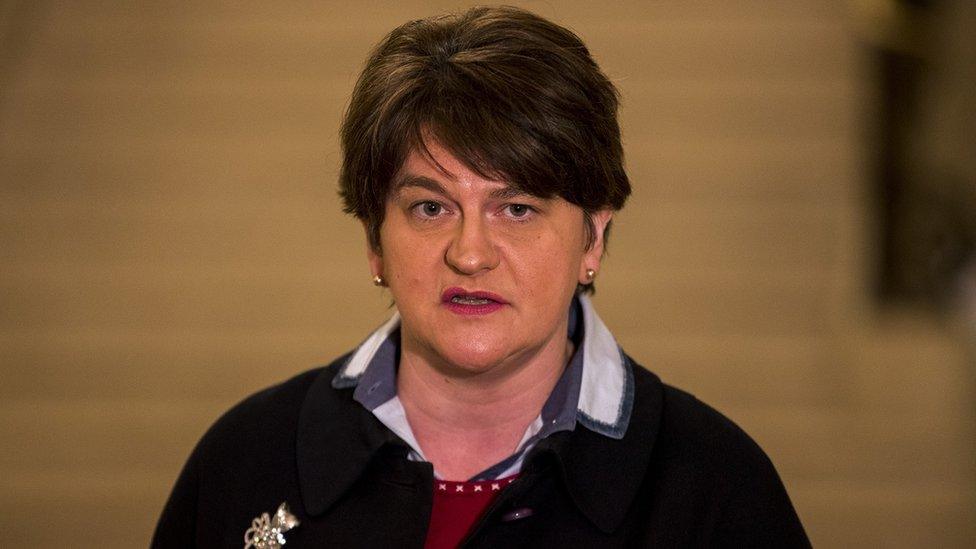
DUP leader Arlene Foster said parts of the deal were "compromise outcomes"
DUP leader Arlene Foster has said the governments' draft deal is not "perfect", but "there is a basis upon which the assembly and executive can be re-established".
The text was published on Thursday night, external.
Arlene Foster said: "There are elements within it which we recognise are the product of long negotiations and represent compromise outcomes."
She was speaking before Sinn Féin backed the deal on Friday.
Northern Ireland Secretary Julian Smith said he hoped the the deal could see the assembly reconvene on Friday but the speaker Robin Newton made clear that could only happen when the parties approached him.
Further scrutiny
The DUP leader Mrs Foster said the party had weighed the governments' paper against its 10 commitments for negotiations.
"There will always need to be give and take," she said.
"The key to making devolution work will be having the resources to do so.
"This element of the paper will require further scrutiny."
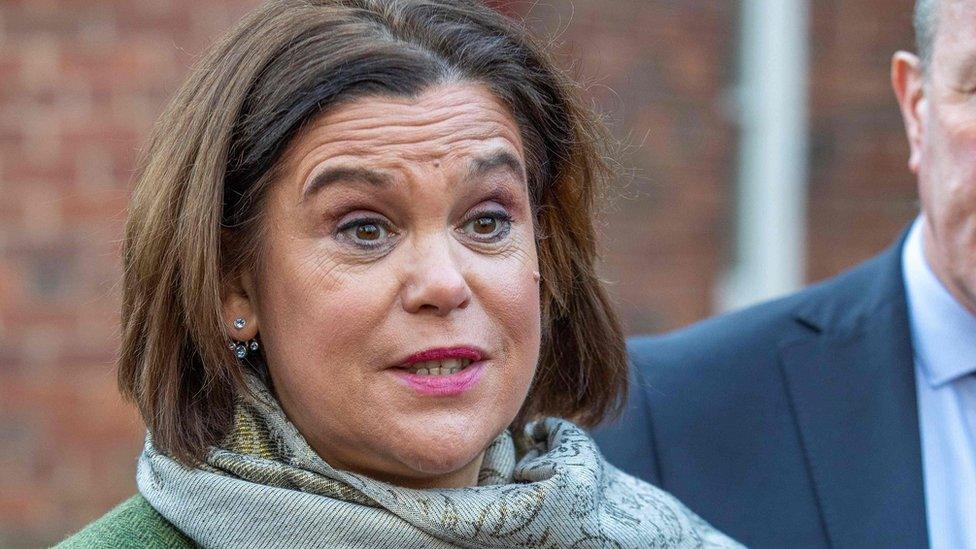
Sinn Féin leader Mary-Lou McDonald said her party would "assess" the text
'Veto' concern
The draft deal was welcomed as an "historic advancement" by the Irish language group Conradh na Gaeilge.
However, it said the proposed legislation "falls very much short" of promises for an Irish language act.
"The role and remit of the commissioner being left to the sign-off of OFMDFM [Office of First Minister and Deputy First Minister - now the Executive Office] leaves us at the whim of a veto being used against core components of the legislation and drafting and delivery of services, said Ciarán Mac Giolla Bhéin from the group.
"The use of any veto to limit, obstruct or frustrate delivery of services and rights would undoubtedly erode trust and could be potentially catastrophic for any incoming Executive."
Questioned earlier on BBC Radio Ulster's Nolan show about whether a unionist veto around the Irish language was included in the small print of the draft document, DUP chief whip Sir Jeffrey Donaldson confirmed: "Unionist consent will be required".
He said: "That is the way Stormont operates. It operates on the basis that there has to be cross-community consent.
"We will not agree to standards that impose Irish on people who don't speak it.
"There will be no compulsory Irish in schools and there will be no Irish road signs."
'Serious concerns'
The Orange Order released a statement saying it has "very serious concerns" about the draft deal and could not support the proposal to appoint an Irish language commissioner.
"The document, which has been released with a purposely narrow window for meaningful consideration, is clearly far reaching in its provision for the Irish language and its subsequent future role in the political and civic life of Northern Ireland," the Grand Orange Lodge of Ireland's statement said.
It added that in contrast to measures to promote the Irish language, "references to Ulster-Scots/Ulster British culture are ambiguous -lacking meaningful detail".
The Orange Order said it would comment further on the draft deal in the coming days after consulting more widely with its members
'Fair and sustainable'
UUP leader Steve Aiken said the party is "committed to a return to devolution that is fair and sustainable".

UUP leader Steve Aiken said his party will attend if the Assembly is recalled
He said: "We will consider this complex and far-reaching document carefully and consult widely within our party before making any further comments.
"If the assembly is recalled on Friday, the Ulster Unionist Party MLAs will attend and consider the business put before them."
Speaking on the BBC's Good Morning Ulster programme, Alliance MLA Kellie Armstrong questioned whether the reforms of the petition of concern detailed in the draft deal go far enough.
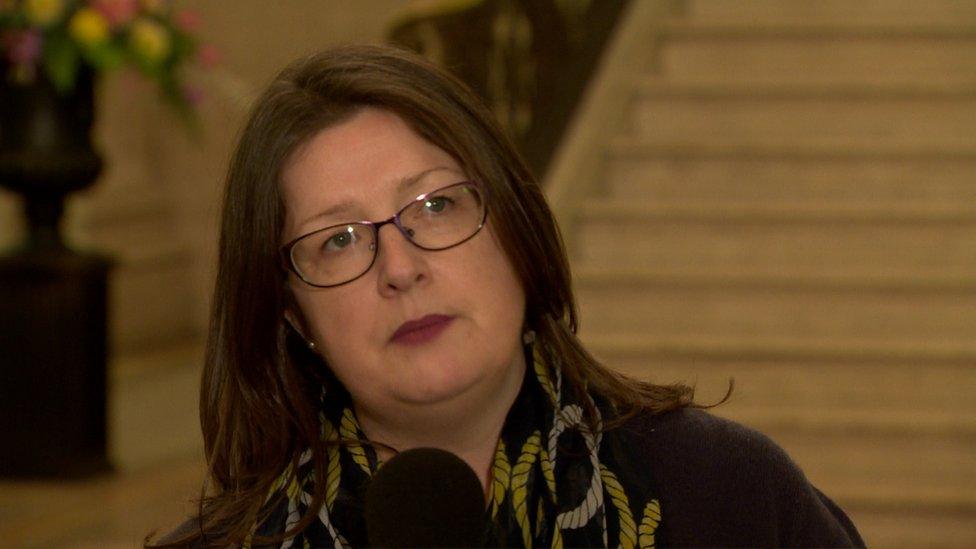
Alliance MLA Kellie Armstrong has concerns about the petition of concern
"That is what we are trying to consider at the moment. This is a new approach," she said.
She said detailed work was also needed on Friday to define the financial aspect of the deal and "the amount of money that has been talked about" for public services in Northern Ireland.
Green Party NI leader Clare Bailey echoed Alliance's concerns that proposed reform of the petition of concern was insufficient and expressed some disappointment that environmental protections in the deal do not go far enough.
However, Ms Bailey added she was "hopeful that this is a deal that will see the restoration of the devolved institutions".
She said it "provides a chance to build towards delivery and accountability" at Stormont.
'Cliff edge moment'
A key focus of the deal is the implementation of health and social care reform, including an end to the healthcare strikes which demand pay parity and safe staffing levels.
Speaking at a picket line in Antrim, the Royal College of Nursing President Anne Marie Rafferty said nurses "want to see the ink on the paper and the deal delivered".
"Words are not enough, deeds are what actually counts."
"It has been a cliff edge moment."
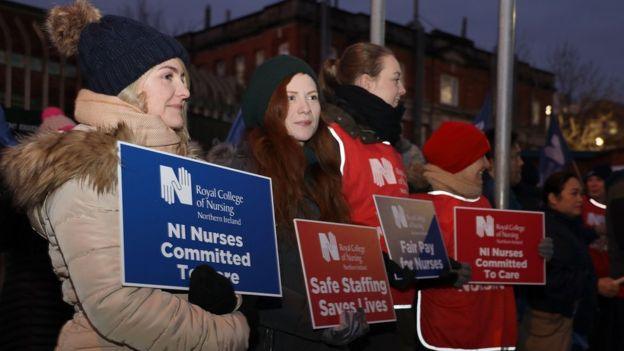
The Royal College of Nursing said "words are not enough"
Education is another area which has come under financial pressure, with the deal promising that schools will have a sustainable core budget.
Geri Cameron, President of the National Association of Head Teachers in Northern Ireland, said while "detail is scant", its representatives are willing to work with MLAs going forward.
'Sign the deal today'
Industry leaders have also been reacting to the proposals. Trade NI, which is an alliance of Retail NI, Manufacturing NI and Hospitality NI, released a statement urging "all the main parties in Northern Ireland to sign the deal today and get the assembly back up and running."
"The clear prioritisation of the Northern Ireland economy highlights the many challenges that businesses have faced over the past three years."
The Institute of Directors Northern Ireland (IoDNI) said commitments for infrastructure projects such as the York Street Interchange, upgrades to the A5 and A6 and Northern Ireland's sewage network were "particularly pleasing".
"Plans for multi-year budgets and increased civic engagement will also improve overall governance," said the IoD's National Director Kirsty McManus.
"From a business perspective however, we would have liked to have seen more around a new skills agenda, which urgently require focus alongside a renewed look at the Apprenticeship Levy which is not included in this deal.
- Published10 January 2020
